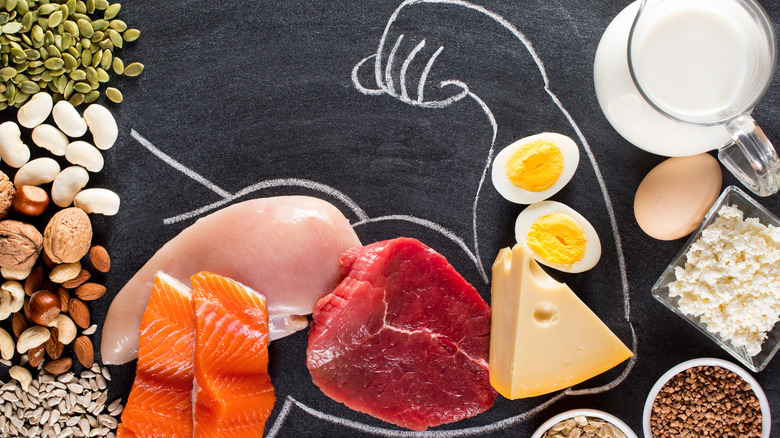The Protein Myth You Should Stop Believing About Your Bones
Scroll through your TikTok feed, and it won't take long before you're blasted with all kinds of health-related tips, tricks, and product endorsements from seemingly anyone and everyone. It's dizzying trying to separate fact from fiction. Of course, the internet isn't the only place we may get wind of potential health rumors; some have simply managed to withstand the test of time. Will crossing your eyes really cause them to stay that way? Do humans really use only 10% of our brains? Experts at the Fort Lauderdale Eye Institute and Scientific American tell us that both of these notions are nothing more than myths. The same is true for the false claim that eating too much protein can do more harm than good for our bones.
According to 2014 research published in Current Opinion in Clinical Nutrition and Metabolic Care, eating greater amounts of protein (along with getting plenty of calcium) benefits our bone health by strengthening our muscles, boosting insulin-like growth factor-1 (IGF-1), and enhancing our intestine's ability to absorb calcium. So far, so good, right? So where did this too-much-of-a-good-thing myth come from?
How the protein myth got started
Researchers from a 2013 scientific review published in the British Journal of Nutrition explain how the claim that too much protein can be detrimental to bone health came to be. They outline how it was born from the long-standing acid load hypothesis and its relation to osteoporosis, a bone disease that affects roughly 10 million Americans (per the Bone Health and Osteoporosis Foundation). Research findings from the 1960s involving patients with chronic kidney diseases claimed that foods, specifically animal protein, could cause an overproduction of acid in the body, leading to bone deterioration.
However, more current studies have found the opposite connection. Rather, eating greater amounts of protein on a daily basis that exceed the standard dietary guidelines has been linked with increased bone mineral density (BMD), slower progression of bone loss, and a reduced susceptibility to hip fractures (via Current Opinion in Clinical Nutrition and Metabolic Care). Presently, the recommended daily intake for protein stands at 0.8 grams per kilogram of body weight.
Animal protein and plant-based protein are both great for bone health
While protein is essential to all of our health, permanently debunking this myth may benefit older adults in particular, who tend to be more susceptible to bone loss as they age. Researchers from the previously mentioned 2014 scientific review note that no negative effects on bone health have been found in association with increased protein intake. Furthermore, as long as we're getting plenty of calcium and other essential nutrients through our diet, whether we opt for animal protein sources or plant-based protein sources seems to make little difference when it comes to hip fracture outcomes, as both have been shown to be beneficial.
While protein may be an important component of our skeletal health, it's not the only one. Physical activity is also critical for bone strengthening, particularly resistance exercise. Therefore, we don't want to rely on an overconsumption of protein to keep our bones healthy. While short-term, high-protein diets may not be a problem for some people, they are not always safe for everyone, cautions the Mayo Clinic. Be sure to always check with your doctor before making any significant dietary changes.



